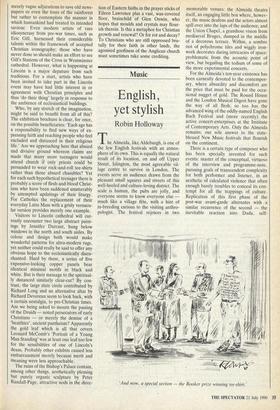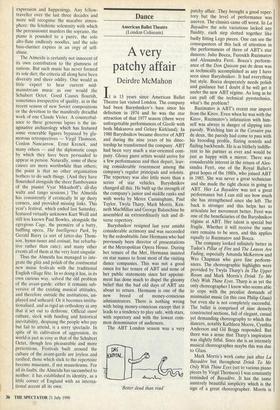Music
English, yet stylish
Robin Holloway
The Almeida, like Aldeburgh, is one of the few English festivals with an atmos- phere of its own. This is equally the natural result of its location, on and off Upper Street, Islington, the most agreeable vil- lage centre to survive in London. The events serve an audience drawn from the pleasant small squares and streets of this well-heeled and culture-loving district. The scale is human, the pubs are jolly, and everyone seems to know everyone else much like a village fete, with a hint of in-breeding curious to the visiting anthro- pologist. The festival rejoices in two
memorable venues: the Almeida theatre itself, an engaging little box where, howev- er, the music deafens and the actors almost spill over into the laps of the audience; and the Union Chapel, a grandiose vision from mediaeval Bruges, dumped in the middle of a decorous terrace. Within, a sombre riot of polychrome tiles and wiggly iron- work decorates daring intricacies of space: problematic from the acoustic point of view, but beguiling the tedium of some of the more experimental concerts.
For the Almeida's ten-year existence has been earnestly devoted to the contempor- ary, where absurdity and discomfort are the price that must be paid for the occa- sional nugget of gold. The Round House and the London Musical Digest have gone the way of all flesh; so too has the advanced wing of the oddly-named English Bach Festival and (more recently) the active concert-enterprises at the Institute of Contemporary Arts. Only the Almeida remains: our sole answer to the state- blessed New Music festivals that flourish on the continent.
There is a certain type of composer who has been specially invented for such events: master of the conceptual, virtuoso of the interview and programme-note, pursuing goals of transcendent complexity for both performer and listener, in an aesthetic of calculated violence that often enough barely troubles to conceal its con- tempt for all the trappings of culture. Replication of this first phase of the post-war avant-garde alternates with a similar recurrence of the, second — the inevitable reaction into Dada, self- 'And now, a special section — the Booker prize winning tee-shirt.' expression and happenings. Any fellow- traveller over the last three decades and more will recognise the macabre atmos- phere: the fetishistic solemnity with which the percussionist murders the soprano, the piano is pounded to a purée, the solo alto-flute endlessly noodles, and the solo bass-clarinet expires in an orgy of self- abuse.
The Almeida is certainly not innocent of its own contribution to the glumness of nations. But such music has never formed its sole diet; the criteria all along have been diversity and sheer oddity. One would as little expect to hear current mid- mainstream music as one would the Schubert Octet. Good Causes flourish, sometimes irrespective of quality, as in the recent season of new Soviet compositions or the devotion to the manifestly dreadful work of one Claude Vivier. A counterbal- ance to these generous lapses is the im- aginative archaeology which has featured some venerable figures bypassed by gla- morous retrospectives — Virgil Thomson, Conlon Nancarrow, Ernst Krenek, and many others — and the diplomatic coups by which they have been persuaded to appear in person. Naturally, some of these causes are more worthwhile than others; the point is that no other organisation bothers to do such things. (And they have flourished alongside the sheer flamboyance of the pianist Vyar Mikashoff's all-day waltz and tango sessions.) The Almeida has consistently if erratically lit up dusty corners, and provided missing links. This year's festival, which ended last Saturday, featured virtually unknown Kurt Weill and still less known Paul Bowles, alongside the egregious Cage, the premiere of a batty, baffling opera, The Intelligence Park, by Gerald Barry (a sort of latter-day Thom- son, hymn-tunes and ostinati, but rebarba- tive rather than cute); and many other events all of them at the very least singular.
Thus the Almeida has managed to inte- grate the glitz and polish of the continental new music festivals with the traditional English village fete. In so doing it has, in its own curious way, solved the old problem of the avant-garde: either it remains sub- versive of the existing musical attitudes, and therefore outside the institutions, un- played and unheard. Or it becomes institu- tionalised, and as rigid an orthodoxy as any that it set out to dethrone. Official outré culture, sleek with funding and historical inevitability, despising the people who pay but fail to attend, is a sorry spectacle. In spite of its cultivation of aggression, its world is just as cosy as that of the Schubert Octet, though less pleasurable and more pretentious. Festivals built around the culture of the avant-garde are joyless and rarified; those which stick to the repertoire become museums, if not mausoleums. For all its faults, the Almeida has succumbed to neither: it has established its identity, as a little corner of England with an interna- tional accent all its own.



















































 Previous page
Previous page